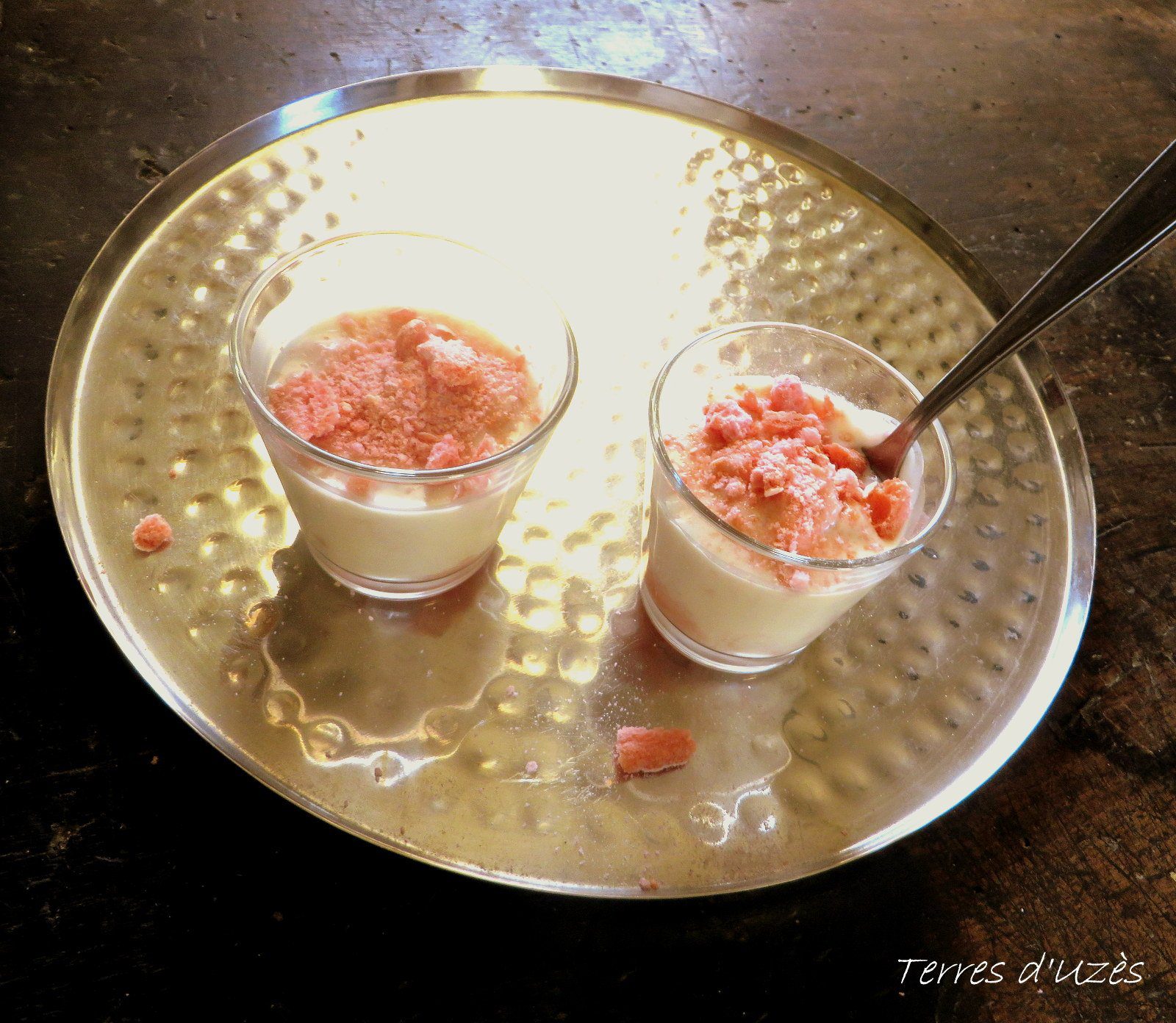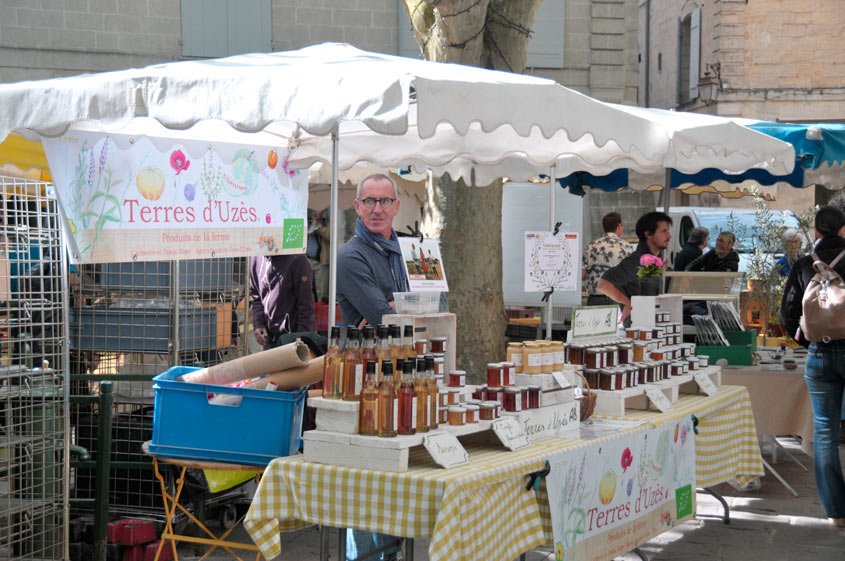
Gold Medal Winners of Taste – Les Terres d’Uzès
Market day in the South of France is a day that provides the opportunity to not only shop for the best in local in-season produce but also a chance to catch up on local happens and run into old friends who might be full of local gossip.
The market can also be an interesting place to make new friends as you get to chat with the producers as well as the other locals who come to count on these weekly events.
It was at one of these market days in Uzès that we first discovered the products of Les Terres d’Uzès. At their stand, you will find all sorts of jams, savory spreads & syrups – all delicious and all organic.
In our Local People series where we are bringing you closer to Uzès through the locals who create here and cultivate the land, I sat down with Pascal and Catherine Roger, our gold medal winners of Taste in the Gard region, for a little Q&A.
Next time you meet Pascal at the market or at one of the many food events held each year, you can appreciate even more the talents of this dynamic duo – the term might be a bit overused at times, but it certainly fits these two well.
Not only will you get to know Les Terres d’Uzès, you might even pick up some great gardening tips as well – I know I have.
Why did you start this company selling organic jams, syrups & sorbets among other things?
Catherine: It was a result of several events. I was on maternity leave and Pascal had his company which harvested grapes [for the wine cooperative] and I could not imagine returning to archaeology [which was my field], given that there were so few job opportunities at the universities or with the CNRS (centre national de la recherche scientifique – The French national research board) and continuing this line of work would have meant having to travel all over France for extended periods of time. I could not see myself leaving Pascal with our three small children each time they would call upon me to head off to another region.
I had to find a job – I didn’t see myself as a housewife and financially it wouldn’t have been possible. So I wanted to build something with Pascal and so the idea came to me to create an atelier around jams & preserves. In the beginning, it was just jams but as time went by, it evolved into more. The idea at the time was to diversify our production so as not to relive what happened to us during the grapevine crisis that touched the wine industry. So now we have grape vines, lavender fields and the atelier for the jams. We are always on the lookout for new ideas.
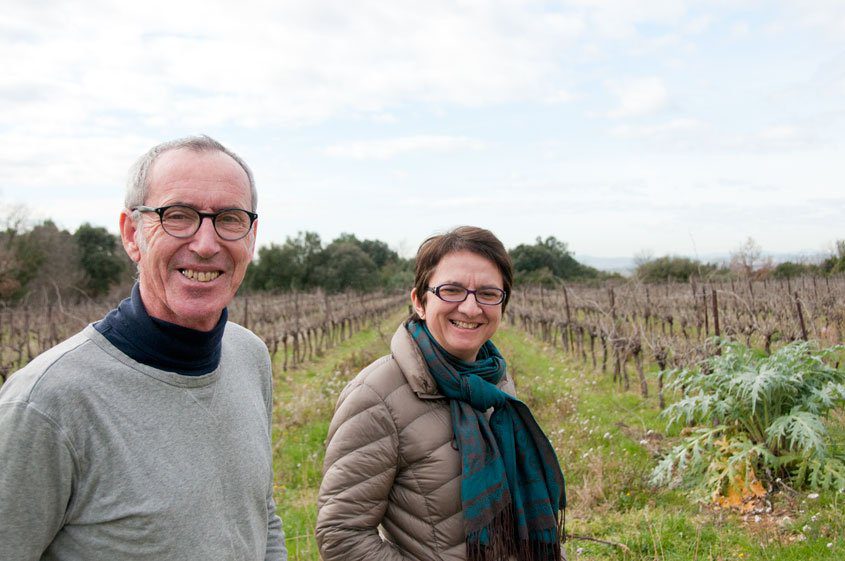 Pascal & Catherine Roger – Les Terres d’Uzès
Pascal & Catherine Roger – Les Terres d’Uzès
What is the biggest challenge you face when you decide to produce organically?
Catherine: Pascal takes care of the farming aspect [of our business] and I take care of the administrative parts as well as the transformation of our raw materials into the final product. So I would say that the most challenging aspect is the paperwork. You have to justify everything. It is very complicated. You have to have each and every recipe validated. If you modify any recipe you have to start all over again to obtain validation. Even your labels have to be validated. You have to be able to produce every single bill. Every detail is scrutinized.
It is not complicated but it takes a lot of time. It is a problem of time and its boring.
Pascal: For me, it is dealing with weeds. We are so quickly invaded by weeds by nature. Nature will always try to regain its territory so it is not dealing with diseases that pose the biggest problem but rather the weeds – all those plants that will invade the cultivation.
“So how do you deal with weeds?”, I asked.
P: Some are by hand and some are mechanic using the tractor. But you have to vigilant – we are in a region of very little rainfall so if we want to be sure that the plants we are growing do not suffer too much from the consequences of our dry summers, we have to get rid of as many weeds as possible [as these weeds] would use up the little water that there is available.
Do you see yourself ever producing in larger quantities to sell to larger boutiques?
C: We do not have a large production. We are not equipped for that. Pascal adds that their production is more artisanal. One pot and one ladle as Catherine puts it.
C: We are aiming at producing 10 000 jars this year which is already not bad. And we don’t really want to be blocked with only one client. So we prefer to work with several and most of the people we work with have some boutiques and are looking for something special to offer their clients. We did try last year to contact some shops but it didn’t work. I think the best way for people to be interested in our products is for them to try it themselves and then to contact us because they have fallen in love with the product. Leaving samples has never been fruitful for us.
It is a long process to gain new clients like this but it is longer lasting. [Our customers] are passionate about the product and what we do. Our prices reflect the fact that we have such a small production so for some vendors, we would be too expensive but we have costs that we can not eliminate as easily as large producers.
I was delighted and amazed to learn that 95% of the ingredients used in their production comes directly from their crops. “We buy the citrus and some spices and sugar – the rest comes from us.”
What is your favorite product?
P: Personally for me, it is the Confiture de Rose and Sirop de Rose (Catherine jokes that Pascal is in love with roses)
C: I don’t really have one. Since I am the one who cooks, I find it more difficult. I need more time to fall in love with a product after tasting it several times. In those first instances, I don’t have enough distance to really appreciate it. I need to forget about it for a while and then return to it to be able to really taste it.
Their daughter was present during our interview (home sick from school), and she tells me that her personal favorite is the tomate épicée which is a spicy tomato spread they created for the apéro (before dinner drinks).
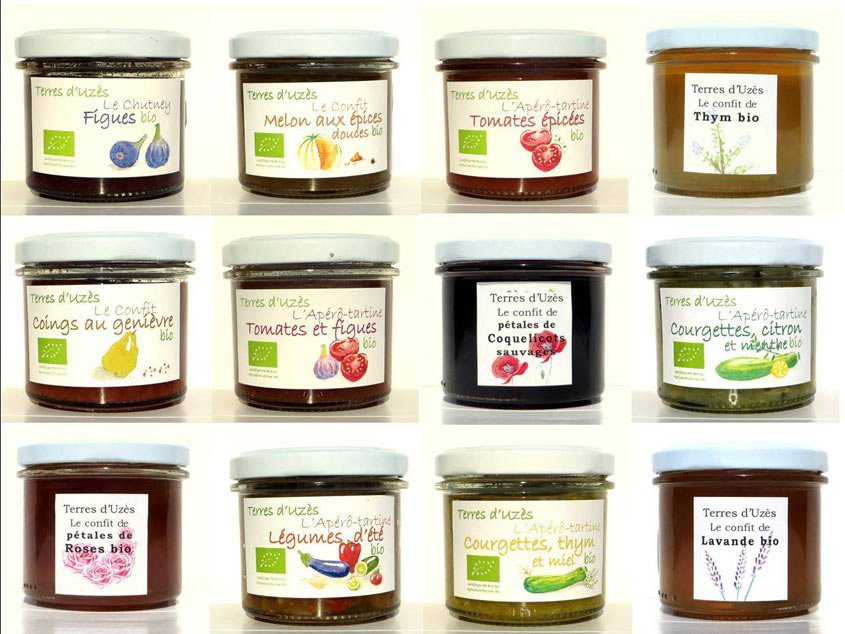 photo credit: Les terres d’Uzès
photo credit: Les terres d’Uzès
Could you give us some tips on preparing the best infusions using fresh herbs
P: First of all you have to, of course, have fresh herbs. Being serious there is fresh and then there is fresh if you know what I mean.
C: You have to be sure about the quality. Depending on how it is produced, the herbs won’t have the same taste. We prioritize the taste which means we don’t water our herbs. They are only watered by the rain. This way they retain all their flavor.
The fact that we don’t water them means we can’t produce everything. We produce plants that don’t need too much water. We don’t grow basil for example as it needs a lot of water. So we do have mint even though they do need a lot of water but they do well around here. We grow lavender, roses, rosemary, verbena, thyme.
I was surprised that they mentioned the roses in their un-watered plants and they explained to me that it was a variety of roses from Damascus which is a rustic variety that is only beautiful for 2 months.
“What changes when you water them,” I asked. –
P: The taste is less concentrated. The plants will be happy of course – they love water but the aromas will be less intense.
They went on in response to my question about their tomatoes to say that they do water their tomatoes but there have been production years when they have not given them that much water which, as they explained, made all the difference in terms of the intensity and taste. Depending on where they decide to plant their tomatoes they could have an earth that has a better capacity of water retention making it less necessary to water frequently but if it is particularly hot, they water.
They often (given they are in organic farming), rotate their parcels allowing the earth to rest in between and finding a new placement for their crops on their land. “That’s the thing about organic farming,” Pascal says, “you will be invaded by weeds and parasites after a while so you have to change where you plant.”
Are there ingredients that are indispensable to your production that you can’t find in organic form?
C: There has been a lot of progress over the years. We start to find more and more things that are organic. For example the stabilizer (carob grain or carob flour), we need for the sorbets existed previously only in very large quantities and for our small production it was just too much. The 25 kilos would have lasted me 10 years if it didn’t (which it would), go bad before that time. Given that they are organic they are expensive so you don’t want to waste any of it. Now you can find it in a more reasonable size. The more the organic farming industry develops the better things become. One product which I’m sure exists but I have not yet found in quantities that I can reasonably work with, are organic almonds that are already peeled. I buy my almonds at the Bio Coop and have to peel them myself. I’m sure I will find them one day.
We saw that you were trying to produce wine from your grape harvest of last year. How’s that coming along?
P: The final results are not in yet but I have much hope for the white, rosé and red.
Are you going to sell these bottles?
P: No, this was a test for ourselves. As far as selling we will see if they are drinkable first. This is really a “vin du garage” as we say. I am making wine in the traditional way which you see less and less of these days. The wine-making is taking place in open oak barrels. The grapes are fermenting naturally in contact with the air around them. It is an ancestral method. There are 3 that are not bad at all. There is one that has us a bit perplexed so we are waiting a bit to see what it gives us. It is a bit flat at the moment. There is a red that is not bad, the rosé is not quite rosé in color – more brick-colored.
An image of the children stopping the grapes barefoot came to mind (or that episode of I Love Lucy that I have always adored) – but Pascal assures me that he wore nice clean rubber boots to do that. Feet in wine may be ancestral but was not exactly his cup of tea or shall I say, a glass of wine.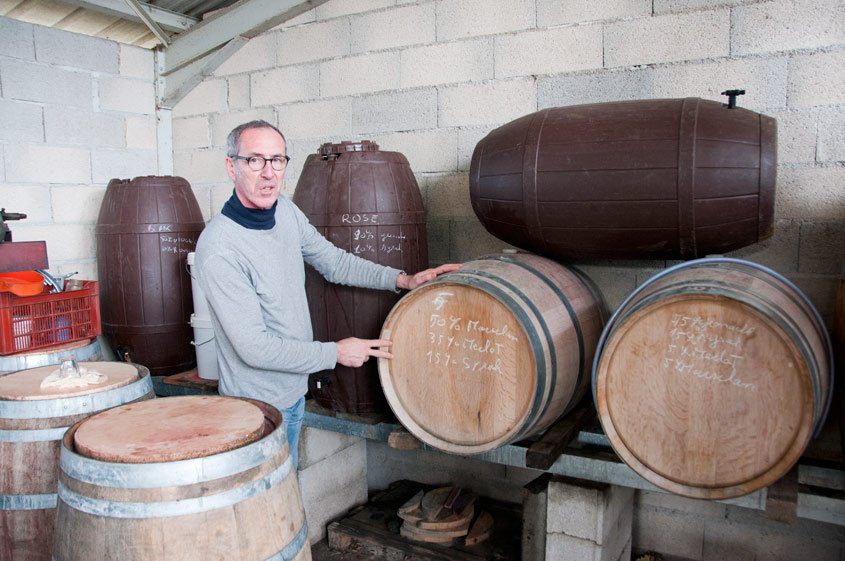
What’s your best selling product?
Confiture des amoureux and the confiture de Citre sell very well as well as the sirop de rose and the sirop de thyme. In our spreads it would be Courgette citron menthe (zucchini, lemon & mint) and tomate et figue (tomato and fig)
Do you find working together as a couple easy enough?
Yes, they both say. Pascal farms, Catherine cooks, Pascal tastes and then they sell.
Where do your recipes come from?
C: We test a lot of them and see how they work out. Testing a new recipe yields about 100-150 jars. If they work we continue.
Do you have a lot of loss? Either due to being organic either your crops or post-production?
We sometimes have an overgrowth as much as having even less than expected not necessarily due to organic cultivation. From one year to the next we may not have a product that we have the year before. When we find that we have not had enough production one year when there is a high demand we adapt for the next year.
We have a total of 28 hectares: 14 vines, 8 lavender, 1 aromatic plant, and the rest smaller gardens
Pascal works the land with some assistance from his father but essentially handles all the farming on their land. In Winter he does take on some help for the pruning of the vines.
What is the most challenging aspect of working for yourself?
Organization; sometimes being motivated. You have to know how to manage your time and anticipate, especially when working with nature.
What is the most gratifying?
Seeing the results of our work and being able to see the appreciation of our labor by the general public.
What about the kids – Are they interested in taking over the family business?
I think it is too early to say. For the moment they think we spend too much time on the farm. Though in reality, we are probably more available than most parents working full-time. We try to make ourselves as present as possible for them. We pick them up from school. We’re there when they get home. . .
There are certain freedoms that come from working for yourself and of course, there are constraints like for everyone. Nature imposes a calendar that we can’t ignore.
With experience, we are now able to master our time better. We have eliminated some of the events that we participated in that took up time but gave little rewards. Of course, we can’t take off too long in the calendar year but we ensure get away from time to time for short breaks.
Where to find Les Terres d’Uzès:
You’ll find Pascal at the Wednesday Uzes producers market. It allows him to get out and see the public. Also, catch him at the Garrigues en fête on the 27th and 28th of March a large event celebrating the beginning of Spring and the natural culture of the region at the Pont du Gard.
Follow them on their Facebook page.
To end our interview, Catherine was nice enough to share one of her recipes using Pascal’s favorite product rose syrup. Enjoy!
Rose verrine, charlotte style
Serves: 10
Boil 10 cl of water and add 2g of agar-agar. Let it simmer for 2 minutes then whisk with 50 g of fromage blanc* (or 20 cl of crème fraîche and 340 g of fromage blanc), and 16 cl of organic rose syrup. Break up some French pink ladyfingers from Reims and use them to garnish your verrines (small glasses). Pour in your preparation and refrigerate until cold.
Before serving powder the top with crumbs of your ladyfingers – It is possible to add some red fruits such as strawberries or raspberries as you like.
*You can substitute greek yogurt or queso fresco if you can’t get your hands on fromage blanc
